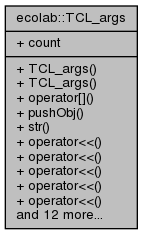Represent arguments to TCL commands. More...
#include <TCL_obj_base.h>

Public Member Functions | |
| TCL_args (int a, Tcl_Obj *const *v) | |
| TCL_args | operator[] (int i) const |
| void | pushObj (Tcl_Obj *obj) |
| const char * | str () |
| TCL_args & | operator<< (const std::string &x) |
| TCL_args & | operator<< (const char *x) |
| TCL_args & | operator<< (bool x) |
| TCL_args & | operator<< (int x) |
| TCL_args & | operator<< (unsigned x) |
| TCL_args & | operator<< (long x) |
| TCL_args & | operator<< (double x) |
| TCL_args & | operator>> (std::string &x) |
| TCL_args & | operator>> (const char *&x) |
| TCL_args & | operator>> (bool &x) |
| TCL_args & | operator>> (int &x) |
| TCL_args & | operator>> (unsigned &x) |
| TCL_args & | operator>> (long &x) |
| TCL_args & | operator>> (double &x) |
| template<class T > | |
| enable_if< is_rvalue< T >, T >::T | get (dummy< 0 > d=0) |
| template<class T > | |
| enable_if< Not< is_rvalue< T > >, T >::T | get (dummy< 1 > d=0) |
| template<class T > | |
| operator T () | |
Public Attributes | |
| const int & | count |
Represent arguments to TCL commands.
Declare a member function taking a single argument of type TCL_args, the extract the arguments using operator>>, or assign the arguments 1 by 1, or use operator[] to access
args[-1] refers to the command name.